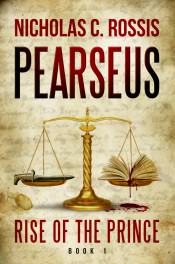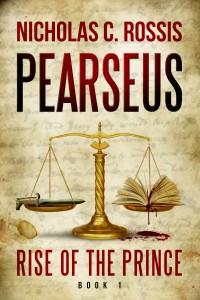Today I have an interview that I’m very excited to share with you. I talk to Nicholas Rossis about his book Pearseus: Rise of the Prince and we discuss politics in Ancient Greece, what life was like for women in Athens, and much more.
The interview is part of a series of posts where I talk to writers about the interesting things they dig up during their research process. If you know of an indie writer who you’d be interested in seeing featured in this kind of interview, let me know in the comments and I’ll see what I can do. And now, on with the interview!
Thanks for taking part in the interview Nicholas, and for being on the blog today! Tell us first a little bit about your book.
 Hi Celine, many thanks for having me here! I assume you’re referring to Pearseus? Its concept came to me after reading Martin’s Song of Fire and Ice series, followed by Jim Lacey’s The First Clash and Herodotus’ Cyrus the Great and Rise of Persia, which describe the fatal battle on Marathon between Greece and Persia in the 5th century BC.
Hi Celine, many thanks for having me here! I assume you’re referring to Pearseus? Its concept came to me after reading Martin’s Song of Fire and Ice series, followed by Jim Lacey’s The First Clash and Herodotus’ Cyrus the Great and Rise of Persia, which describe the fatal battle on Marathon between Greece and Persia in the 5th century BC.
Marathon Bay is a 20’ drive from my home, and I’d often visited the tomb where the ancient Athenians buried their dead, so I thought at the time, “wouldn’t it be great if someone did what Martin did for medieval England, only with the story of Greece vs. Persia? And in space? How cool would that be?” Then it occurred to me: so, what’s stopping me from writing it?
I have to admit it’s the first time I’ve come across a book that mixes science-fiction with Ancient Greek culture — but it works very well!
Can you tell me a little about the kind of research you did into Ancient Greece? What are the most interesting/random facts you unearthed? Were there any books or websites that were particularly useful in your research?
 I’m so glad to hear it worked for you! Pearseus follows the overall story arc of Herodotus’ seminal work, Cyrus the Great and Rise of Persia, which describes the fatal battle on Marathon between Greece and Persia in the 5th century BC. Only, my book is set in the future. While researching it, I read Lacey’s book, Herodotus and a lot of Wikipedia articles.
I’m so glad to hear it worked for you! Pearseus follows the overall story arc of Herodotus’ seminal work, Cyrus the Great and Rise of Persia, which describes the fatal battle on Marathon between Greece and Persia in the 5th century BC. Only, my book is set in the future. While researching it, I read Lacey’s book, Herodotus and a lot of Wikipedia articles.
An interesting factoid: I had originally chosen the title Perseus for the series, but a good friend of mine, Mike Cardwell, asked me if I had considered how many other books are titled Perseus on Amazon. A quick search revealed over 10,000 books with that name! Obviously, something had to change, and it occurred to me to make it Pearseus instead, using a pun to justify the change.
As for facts I unearthed during my research, they’re too many to list here. One particularly interesting fact, which I did not mention in Pearseus, concerns the role of women. In Athens, women were little more than property. They had no voting rights, nor were they allowed a life outside the home. As soon as a girl reached puberty, she was locked up until she got married. After that, a woman’s place was at home, raising her children and taking care of her husband. What would get people arrested nowadays, was common practice back then.
Strangely enough, it was the prostitutes who enjoyed freedom. Much like the famous courtisanes, their 19th century French counterparts, or the Japanese geishas, these were women of exceptional beauty, skilled in oratory and philosophy. In the deeply chauvinistic Athenian society, men freely fraternized with them at the famous symposia, or dinner parties, before returning to their home and loving wives.
Prostitutes were highly educated, had the right to possess property of their own and often escorted kings and philosophers. Their clients included legendary Pericles and Socrates; cities built temples in their honor and showered them in gold. This, in a city where it was considered a deadly insult to the husband if his wife was caught even conversing with another man.
If you’re interested in the subject, I have written a post dedicated just to that aspect of Greek society, called The Real Women of Pearseus.
That’s quite incredible about Athen’s double standards as far as women go. It sounds like life was far better for the prostitutes! (I highly recommend Nicholas’ article on women in Ancient Greece by the way, the part about Spart is fascinating)
The world you created is full of political intrigue and scheming politicians. How did you go about creating all those complex alliances and betrayals, political deals and manoeuvres?
Lol – I have my ancestors to thank for that. Will you believe that most of the stranger stories are based in actual history? For example, my character, Sol, is an amalgamation of Solon, Athens’ first law-giver, and Peisistratos, a cunning politician who usurped power and used it to end decades of civil strife. His reformations lay behind Athens’ classical glory, helped by Solon’s wise laws.
These men are considered heroes of classical Greece, but only after growing up did I realize the devious lengths to which they went to ensure their triumph over their political opponents. For example, Peisistratos was a ruthless, cunning dictator who staged an assassination attempt against himself. And Solon pretending for a whole year to be mad, so he would excused when he spoke in favor of war – a crime punishable by death by Draco’s laws.
The history of Pearseus includes one population colonising another’s territory. Did you base this on the the colonisation of a particular country on Earth?
Some readers have speculated that the First are based on native Americans, and I can see why. There is an influence there, as witnessed by the small-scale warring between tribes and the hunter-gatherer lifestyle.
However, most of my descriptions stem from a combination of prehistoric beliefs in Mother Earth (The Lady worshipped by the First) and the Scythians; a warlike tribe that populated Thrace and the Black Sea in antiquity. This is where truth and fiction divert, of course, as the Persian king Cyrus was in fact killed while fighting the Scythians. Unless something changes dramatically, I’d like to avoid this fate for my Cyrus!
There are a number of large scale battles in this story, with tactics that bring to mind Sun Tzu’s Art of War. In fact one of your characters, Parad, recites a few strategy of war quotes. Are they real or made up? And how did you go about planning those battles? Did you research any particular Grecian or European wars for inspiration?
 Most of the quotes are real, and taken from either the Art of War or the Tao Te Ching; one of my favorite books, which I have translated into Greek. I did research a lot of battles, such as the Battle of Golden Spurs. The main battle between the Loyalists and Parad was based on a stratagem by Alexander the Great. He crossed the river Aly at night (yes, that’s the river’s actual name) to emerge from behind the Persians and launch a surprise attack.
Most of the quotes are real, and taken from either the Art of War or the Tao Te Ching; one of my favorite books, which I have translated into Greek. I did research a lot of battles, such as the Battle of Golden Spurs. The main battle between the Loyalists and Parad was based on a stratagem by Alexander the Great. He crossed the river Aly at night (yes, that’s the river’s actual name) to emerge from behind the Persians and launch a surprise attack.
The idea of using a herd of buffalos to break up the enemy’s formations is all mine, though.
 Then, the war between Scorpio and the Argonites is based on the actual war between Sparta and Argos. The Spartans had noticed that Argos was mimicking their commands, so used it to their advantage to crush them. When Argos’ warriors fled, they hid in a sacred woods. Unable to enter, the Spartans lured the survivors out by falsely suggesting that their families had ransomed their safety. The Spartans then killed them one by one as they emerged from the woods.
Then, the war between Scorpio and the Argonites is based on the actual war between Sparta and Argos. The Spartans had noticed that Argos was mimicking their commands, so used it to their advantage to crush them. When Argos’ warriors fled, they hid in a sacred woods. Unable to enter, the Spartans lured the survivors out by falsely suggesting that their families had ransomed their safety. The Spartans then killed them one by one as they emerged from the woods.
I love reading history because it really is stranger than fiction…
We are introduced to Tie, a priestess of Themis, and she explains a little about the religion — or rather the ideal, that so many people in your world worship. Where did the inspiration come from for this religion?
Religion and philosophy play a huge part in Pearseus, so I’m really glad that you ask. Some concepts, such as the soul splitting up upon entering the multiverse is all my own, just like the concept of the Iota.
More than anything, I wanted to show that our actions stem from our beliefs, and that these are heavily influenced by religion. At first, I had wanted to address this from an unusual point of view; that of the future of religions. For example, how would Buddhists, Christians and Muslims get along, if forced to cohabit? You can see a hint of that in the Shared temples.
However, I soon realized I was opening a can of worms. There was no way I could write something like that without offending pretty much everyone. After much thought, I chose instead to create a new religion, based on the ancient Greek worship of Themis; the Titan goddess of divine law and order. This tied in nicely with the concept of the limits of power and the claims to justice made by virtually every ruler in history.
“Justice without compassion is but tyranny” is not just a clever phrase; to me it’s a way of living. A religion based on that concept had to be a good one, but I also wanted to show how easy it is to corrupt a religion. In Endgame, the last book in the series, the new head priest, Alexander does just that.
Thank you so much for coming on the blog today Nicholas, that was so interesting!
Pearseus: Rise of the Prince by Nicholas Rossis
Humanity starts all over again on Pearseus, a distant planet.
Cyrus, the young son of general Parad, is abducted by Justice Styx, ruler of the Capital. She orders a cruel death for the child, thinking this will spare her a foretold death in his hands. But Cyrus escapes with the help of the First – Pearseus’ indigenous people.
David, a young servant, is joined by an ethereal entity. Together, they escape the Capital and join Cyrus and the First. They all become embroiled in the complex political and philosophical factions of a multi-dimensional world. To their surprise, they have a key role to play in saving the planet’s inhabitants from annihilation.
Now Available:
Nicholas has also just released a new book: Infinite Waters: 9+1 Speculative Fiction Short Stories. It’s available on Amazon and is free on Kindle Unlimited. The anthology includes the following stories:
- “Infinite Waters“: A woman seeks her future at a carnival. She discovers more than she expected.”
- “The Things We Do for Lust“: Beware of Greek gods bearing gifts.
- “James’ Life“: A man with nothing to look forward to but oblivion, discovers it’s not that easy to escape his life.
- “Two’s a Crowd“: Blood runs thicker than water. Especially when you spill it.
- “What’s in a Name?“: A pleasure cruise to the moon has an unexpected ending.
- “The Lucky Bastard“: How far will the luckiest man alive go to escape his luck?
- “A Twist of the Tail“: A confused woman meanders through a sleepy town. But not all is as it seems.
- “Is There a Doctor in the House?“: A high school student just loves to experiment.
- “Sex and Dinner“: A timeless combination. Or is it?
- “Would You Like Flies With That?“: Nothing’s scarier than a supermarket.
- “The Hand of God“: Nothing has prepared this grizzly veteran for a meeting with his god*.
(* first published in The Power of Six)
About the author:
 Nicholas C. Rossis lives to write and does so from his cottage on the edge of a magical forest in Athens, Greece. When not composing epic fantasies or short sci-fi stories, he chats with fans and colleagues, writes blog posts, walks his dog, and enjoys the antics of two silly cats, one of whom claims his lap as home. His children’s book, Runaway Smile, earned a finalist slot in the 2015 International Book Awards.
Nicholas C. Rossis lives to write and does so from his cottage on the edge of a magical forest in Athens, Greece. When not composing epic fantasies or short sci-fi stories, he chats with fans and colleagues, writes blog posts, walks his dog, and enjoys the antics of two silly cats, one of whom claims his lap as home. His children’s book, Runaway Smile, earned a finalist slot in the 2015 International Book Awards.
What readers are saying about Nick’s fantasies:
“Most avid readers still have books from their childhood which they read over and over again. ‘Runaway Smile’ has joined the list.”
“From the very first sentence I realized I was not reading a book, I was going on an adventure.”
For more on Nick or just to chat, visit him on:



Great interview Nicholas and Celine. Having read the series, I was intrigued to learn how you used Greek history to inform the story. It all seemed so organic to the world you designed in the story. Very entertaining 🙂
LikeLiked by 1 person
Thank you, D! This was one of my best interviews, simply because Celine tailored her questions to my writing so well. I guess we can’t help but write what’s in our head – be it cultural references, encyclopedic knowledge or just ideas.
LikeLiked by 1 person
Absolutely – although I’m very jealous of your encyclopaedic knowledge of Ancient Greece! 😉
LikeLiked by 1 person
Aw, you’re too kind 🙂
LikeLike
It makes perfect sense that her familiarity with your books would make for a great interview! Well done.
LikeLiked by 1 person
Glad you enjoyed it D! Same as you I was curious about Nicholas’ research process since he has so much in the way of interesting details in his book. Always fun to unearth what went on behind the scenes!
LikeLiked by 2 people
Excellent interview, Celine. Sometimes the writing seems so effortless that I forget all the background work. Thanks for highlighting an important aspect of writing and the writer. 😀
LikeLiked by 1 person
Reblogged this on Have We Had Help? and commented:
Read Celine’s interview with Nicholas 🙂
LikeLiked by 1 person
Thank you so much for the lovely interview, Celine. I love how you’ve linked to my inspirations, as well as to my books. And special thanks for your well-tailored questions. It’s been a genuine pleasure being on your blog 🙂
LikeLike
My pleasure Nicholas! 😀
LikeLiked by 1 person
Wow. Science fiction and ancient Greeks–what an interesting combination.
Nicholas is very prolific!
LikeLiked by 1 person
Thanks! As my wife would assure you, annoyngly so 😀
LikeLike
Fascinating interview. Sounds like a great story.
LikeLiked by 1 person
Thanks! I had a lovely time answering Celine’s great questions 🙂
LikeLike
It is, I recommend it 🙂
LikeLiked by 1 person
A great interview, with lots of fascinating information. Ancient Greece in space sounds particularly interesting. 😀 Thank you Nicholas and Celine!
LikeLiked by 1 person
Thanks, I’m glad you enjoyed it. Ancient Greece in space reminds me of the muppet show: “Pigs in spaaaace!” 😀
LikeLike
Pleasure Sara, I’m glad you enjoyed it!!
LikeLike
I love the whole concept for your series, Nicholas. Thanks for providing all those great snippets of history – I always love learning more about the past! Celine, your interviews are always worth reading – you ask such great questions! Keep ’em coming. 🙂
LikeLiked by 1 person
Thank you so much, Sue! Celine’s questions were great 🙂
LikeLiked by 1 person
Aw thanks Sue! It’s a lot of fun for me to do too so I’m definitely going to continue!!
LikeLiked by 2 people
Fantastic interview. I too think history is really stranger than any fantasy, this is why I think historical fantasy is a powerful ground to explore.
Then I’m also particularly fascinated with Greek history, because I think that’s where all us Europeans really come from.
Thanks so much for sharing this Celine and Nicholas, both for the fascinating story and the fascinating history 🙂
LikeLiked by 1 person
Thank you so much, Sarah! Indeed, historical fantasy can be quite the goldmine 🙂
LikeLike
Pingback: Celine Jeanjean Interviews Nicholas C. Rossis | Nicholas C. Rossis
Reblogged this on Legends of Windemere and commented:
Check out this fun and interesting interview!
LikeLiked by 1 person
Very interesting interview. Thanks.
LikeLiked by 1 person
Thank you, John 🙂
LikeLiked by 1 person
What a fantastic, in-depth interview! 🙂
LikeLiked by 1 person
Thank you so much, Debby!
LikeLiked by 1 person
Great interview, Celine and Nicholas! Pressed to reblog later! Always learning new things from Nicholas!! 🙂
LikeLiked by 1 person
Thanks Patrick! Yes, Nicholas had some great tidbits to share 🙂
LikeLiked by 1 person
That is so kind of you, Patrick! Thank you 🙂
LikeLike
What a fascinating interview! I had the obviously misbegotten idea the women of ancient Greece were liberated. Instead, they were treated as badly as, or worse than, Muslim women (except the prostitutes). Interesting that prostitutes are now considered as lower class citizens. Despite all that, the Greeks were still head and shoulders above any other civilization at the time.
LikeLiked by 1 person
I had no idea how women were treated in ancient Greece either — and I was pretty shocked!! It’s very interesting to see the change in status of prostitutes. I wonder when that first happened – my gut feeling says probably around the rise of Christianity, but I could be way off the mark.
LikeLiked by 1 person
Amazingly enough, Christianity liberated women, with its emphasis on equality (since everyone’s a child of God, whether slave or free man, man or woman etc). I believe this played no small part in its triumph over the old gods. It was not until much later that the misogynistic aspects of Christianity emerged.
So, to answer your question, Celine, the situation I’m describing was the 5th century BC status quo in most city-states. The ironic exception being Sparta – arguably the most militaristic society ever – which already held equal rights for women by then.
Greek civilization was probably the most advanced of its time in Europe, but let’s not forget the equally wonderful civilizations of Egypt, Persia, India and China, among others. Not that I don’t appreciate the compliment, of course 🙂
LikeLike
Brilliant interview, Nick and Celine! I think the best fiction always comes from looking at history, or pre-history. Nothing we make up can compare. Truth is definitely stranger than fiction. Best of luck with your books, Nick!
LikeLiked by 1 person
Thanks Ali!! I totally agree – history is often far stranger than fiction. Makes for the perfect inspiration for us writers 🙂
LikeLiked by 2 people
Thank you so much, Ali! Indeed, there is so much inspiration in history.
LikeLiked by 1 person
I’ve just written a yet un-posted review for this book. I’m glad I wrote it before reading this as I did get some of the inspirations right although I did miss who Sol was based on.
LikeLiked by 1 person
It’s fascinating learning all the inspiration behind the scenes, isn’t it?
LikeLiked by 1 person
Yes it adds an another layer to the book.
LikeLiked by 1 person
Yay! That is so kind of you, Eric – thank you!!
LikeLiked by 1 person
It could be a 1 star review! You might not be thanking me then
LikeLiked by 1 person
Lol – fair enough. Still, I do appreciate the time a reader spends reviewing 🙂
LikeLiked by 1 person
Great interview! Nicholas is a fascinating person and a talented storyteller! Love his books!
LikeLiked by 1 person
Glad you liked the interview! I agree, Nicholas tells a great story 🙂
LikeLiked by 1 person
Aw, you two! Thank you *blush* 🙂
LikeLiked by 1 person
Terrific interview – great insights about the making of Pearseus. As always, I’m astounded by your deep knowledge of ancient Greek history, my friend. Well done 🙂
LikeLiked by 1 person
Thank you so much, Fros! Well, you can’t be a writer if you don’t read now, can you? 🙂
LikeLike
Reblogged this on s a gibson and commented:
Interview with Nicholas Rossis and politics in ancient Greece!
LikeLiked by 1 person